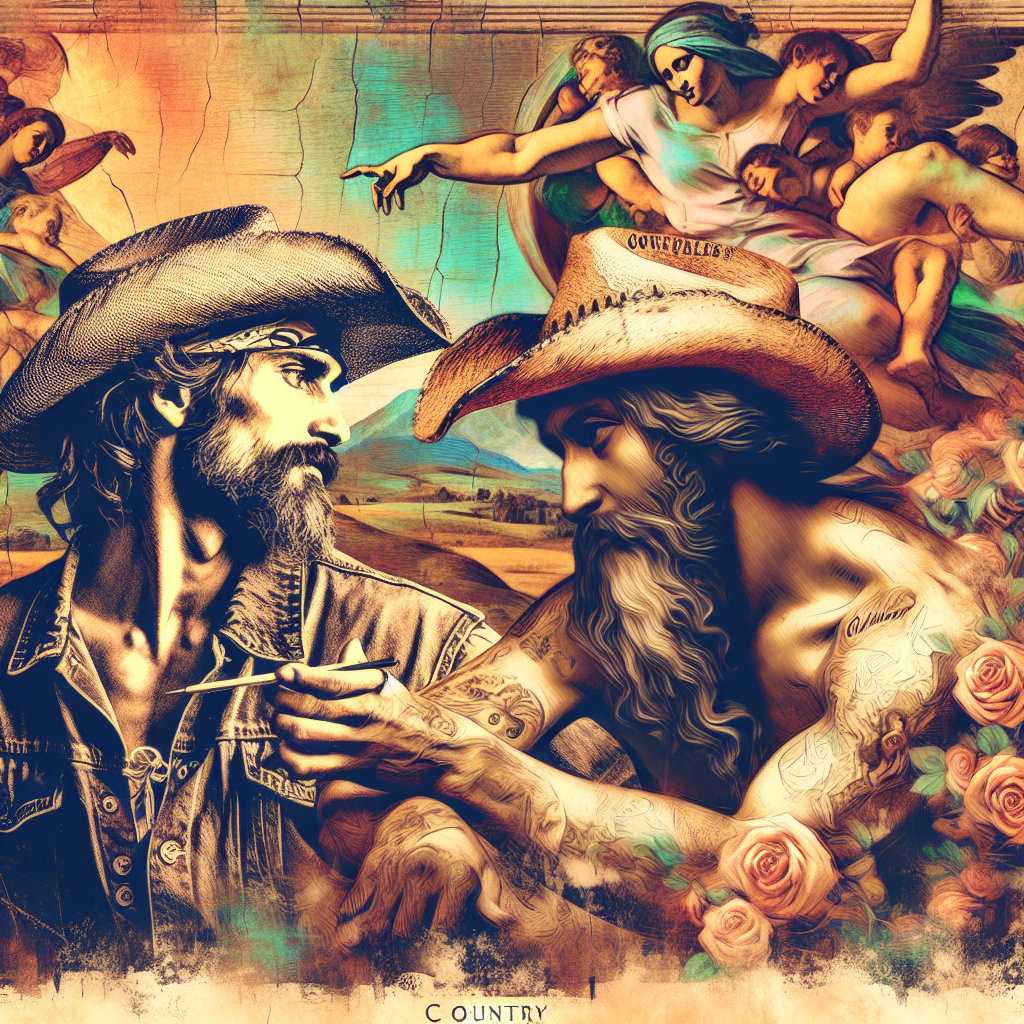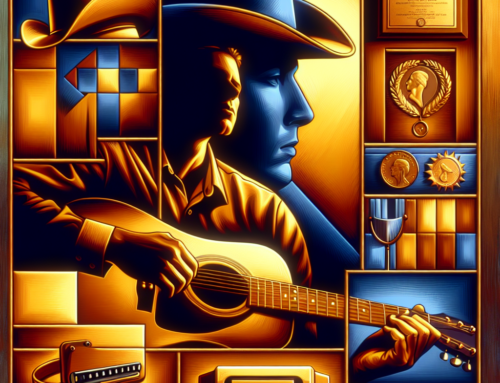-
Table of Contents
- Introduction
- The Roots Of Outlaw Country: A Historical Perspective
- Key Figures In The Outlaw Country Revival Movement
- The Influence Of Outlaw Country On Modern Music
- How Outlaw Country Challenges Mainstream Norms
- The Role Of Storytelling In Outlaw Country Lyrics
- Outlaw Country’s Impact On American Culture And Identity
- Q&A
- Conclusion
“Outlaw Country Revival: Where the Spirit of Rebellion Rides Again.”
Introduction
Outlaw Country Revival: Bringing Back Rebel Country is a movement that seeks to rekindle the raw, unfiltered spirit of the original outlaw country genre that emerged in the 1970s. This revival celebrates the rebellious ethos and authentic storytelling that artists like Willie Nelson, Waylon Jennings, and Johnny Cash championed, challenging the polished norms of Nashville’s mainstream country music. By embracing themes of individualism, defiance, and the rugged realities of life, the Outlaw Country Revival aims to reconnect with the roots of country music, offering a fresh yet nostalgic sound that resonates with both longtime fans and a new generation of listeners. Through a blend of traditional instrumentation and modern influences, this revival not only honors the legacy of its pioneers but also paves the way for contemporary artists to express their own unique voices within the genre.
The Roots Of Outlaw Country: A Historical Perspective
Outlaw country, a subgenre of country music that emerged in the late 1960s and 1970s, represents a significant departure from the polished, mainstream Nashville sound that dominated the airwaves during that era. This movement was characterized by its raw, unfiltered approach to music, often infused with elements of rock and folk, and its lyrical focus on themes of rebellion, individualism, and authenticity. To understand the roots of outlaw country, it is essential to explore the socio-cultural and musical landscape of the time, which set the stage for this rebellious genre to flourish.
The origins of outlaw country can be traced back to a growing dissatisfaction among certain artists with the commercialized nature of the Nashville music industry. During the 1960s, country music was heavily controlled by producers and record labels, who dictated the sound and image of artists to ensure mass appeal. This often resulted in a homogenized product that lacked the grit and sincerity that many musicians felt was integral to the genre. In response, a group of artists began to push back against these constraints, seeking greater creative freedom and a return to the roots of country music.
One of the pivotal figures in this movement was Willie Nelson, who, after years of struggling within the confines of the Nashville system, relocated to Austin, Texas. There, he found a burgeoning music scene that embraced a more eclectic and free-spirited approach. This environment allowed Nelson to experiment with his sound, blending traditional country with rock and folk influences. His success in Austin inspired other artists to follow suit, leading to the development of a distinct outlaw country sound.
Similarly, Waylon Jennings played a crucial role in the outlaw country movement. Frustrated with the lack of artistic control he experienced in Nashville, Jennings fought for the right to produce his own records. His landmark album, “Honky Tonk Heroes,” released in 1973, is often credited with solidifying the outlaw country genre. The album’s raw sound and introspective lyrics resonated with audiences, proving that there was a market for music that defied conventional norms.
Moreover, the cultural climate of the 1960s and 1970s, marked by social upheaval and a questioning of authority, provided fertile ground for the rise of outlaw country. The genre’s themes of rebellion and nonconformity mirrored the broader countercultural movements of the time, appealing to a generation that was increasingly disillusioned with traditional values. Outlaw country artists often portrayed themselves as outsiders and renegades, challenging the status quo and celebrating a rugged individualism that resonated with fans.
As the outlaw country movement gained momentum, it began to influence the broader country music landscape. Artists such as Johnny Cash, Merle Haggard, and Kris Kristofferson, who shared similar sensibilities, became associated with the genre, further cementing its place in music history. The impact of outlaw country extended beyond its immediate era, leaving a lasting legacy that continues to inspire contemporary musicians.
In conclusion, the roots of outlaw country are deeply intertwined with a desire for artistic freedom and authenticity, set against a backdrop of cultural change and rebellion. By challenging the conventions of the Nashville music industry and embracing a more raw and honest approach, artists like Willie Nelson and Waylon Jennings paved the way for a genre that celebrated individuality and defied expectations. Today, the spirit of outlaw country endures, reminding us of the power of music to challenge norms and express the complexities of the human experience.
Key Figures In The Outlaw Country Revival Movement
The resurgence of outlaw country music, often referred to as the Outlaw Country Revival, is a fascinating phenomenon that has captured the attention of both music enthusiasts and cultural theorists alike. This movement, characterized by its rebellious spirit and raw authenticity, harkens back to the original outlaw country era of the 1970s, which was spearheaded by legendary figures such as Willie Nelson, Waylon Jennings, and Johnny Cash. Today, a new generation of artists is breathing life into this genre, drawing inspiration from their predecessors while infusing their own unique perspectives and sounds.
One of the key figures in the Outlaw Country Revival is Sturgill Simpson, whose music embodies the essence of rebellion and authenticity. Simpson’s approach to country music is both innovative and respectful of tradition, as he seamlessly blends elements of rock, blues, and psychedelia into his sound. His critically acclaimed album, “Metamodern Sounds in Country Music,” serves as a testament to his ability to push the boundaries of the genre while maintaining its core values. Simpson’s work has not only garnered a dedicated fan base but has also inspired a new wave of artists to explore the possibilities within outlaw country.
Similarly, Margo Price has emerged as a prominent voice in the revival movement, bringing a fresh perspective to the genre with her poignant storytelling and unapologetic honesty. Price’s music often delves into themes of personal struggle, resilience, and defiance, echoing the spirit of the original outlaw country artists. Her debut album, “Midwest Farmer’s Daughter,” received widespread acclaim for its raw and authentic portrayal of life’s hardships, further solidifying her place as a key figure in the movement. Price’s ability to connect with audiences on a deeply emotional level has made her a vital force in the revival of outlaw country.
In addition to Simpson and Price, Chris Stapleton has played a significant role in the resurgence of outlaw country. Known for his powerful voice and soulful songwriting, Stapleton has managed to bridge the gap between traditional country and contemporary sounds. His breakout album, “Traveller,” not only achieved commercial success but also resonated with fans of classic country music. Stapleton’s dedication to preserving the authenticity of the genre while introducing modern elements has made him a pivotal figure in the Outlaw Country Revival.
Moreover, the influence of these artists extends beyond their music, as they have collectively fostered a sense of community and camaraderie among fans and fellow musicians. This sense of unity is reminiscent of the original outlaw country movement, where artists often collaborated and supported one another in their quest for creative freedom. By embracing this spirit of collaboration, the current revival movement has created a vibrant and dynamic landscape for outlaw country music to thrive.
In conclusion, the Outlaw Country Revival is a testament to the enduring appeal of rebellion and authenticity in music. Through the efforts of key figures such as Sturgill Simpson, Margo Price, and Chris Stapleton, the movement has successfully reinvigorated the genre, attracting a diverse audience and inspiring a new generation of artists. As the revival continues to gain momentum, it serves as a reminder of the power of music to challenge conventions and celebrate individuality, ensuring that the legacy of outlaw country endures for years to come.
The Influence Of Outlaw Country On Modern Music

Outlaw country, a subgenre that emerged in the late 1960s and 1970s, has left an indelible mark on the landscape of modern music. Characterized by its rebellious spirit and a departure from the polished sounds of Nashville’s mainstream country, outlaw country was pioneered by artists like Willie Nelson, Waylon Jennings, and Johnny Cash. These musicians sought to break free from the constraints of the traditional country music establishment, crafting a sound that was raw, authentic, and deeply rooted in personal storytelling. As we examine the influence of outlaw country on contemporary music, it becomes evident that its legacy continues to resonate with artists across various genres.
To understand the impact of outlaw country on modern music, one must first appreciate its foundational ethos. At its core, outlaw country was a reaction against the commercialization of country music. Artists within this movement prioritized artistic freedom and authenticity over commercial success, often drawing inspiration from folk, rock, and blues. This blending of genres created a sound that was both innovative and deeply personal, allowing musicians to explore themes of heartache, rebellion, and social commentary. Consequently, this approach has inspired countless modern artists who seek to push the boundaries of their respective genres.
In the realm of contemporary country music, the influence of outlaw country is particularly pronounced. Artists such as Sturgill Simpson, Chris Stapleton, and Kacey Musgraves have embraced the spirit of the outlaw movement, infusing their music with a sense of authenticity and individuality. These musicians often eschew the formulaic structures of mainstream country, opting instead for a more organic and introspective approach. By doing so, they have reinvigorated the genre, attracting a new generation of listeners who crave substance and sincerity in their music.
Moreover, the impact of outlaw country extends beyond the confines of the country genre. In the world of rock and alternative music, the rebellious ethos of outlaw country has found a home among artists who value creative freedom and authenticity. Bands like The Black Keys and The White Stripes have drawn inspiration from the raw, unfiltered sound of outlaw country, incorporating its elements into their own music. This cross-pollination of genres has resulted in a rich tapestry of sound that defies easy categorization, reflecting the enduring influence of the outlaw movement.
Furthermore, the storytelling aspect of outlaw country has had a profound effect on modern songwriting. The genre’s emphasis on narrative-driven lyrics has inspired artists across the musical spectrum to prioritize storytelling in their work. This focus on narrative allows musicians to connect with their audiences on a deeper level, fostering a sense of intimacy and relatability. As a result, the legacy of outlaw country can be seen in the works of singer-songwriters from various genres, who continue to explore themes of love, loss, and personal struggle.
In conclusion, the influence of outlaw country on modern music is both significant and far-reaching. By championing artistic freedom and authenticity, the pioneers of the outlaw movement have inspired a new generation of musicians to challenge the status quo and create music that is both innovative and deeply personal. As contemporary artists continue to draw inspiration from the rebellious spirit of outlaw country, its legacy will undoubtedly endure, shaping the future of music for years to come.
How Outlaw Country Challenges Mainstream Norms
Outlaw country, a subgenre of country music that emerged in the late 1960s and 1970s, is experiencing a revival that challenges mainstream norms in the music industry. This resurgence is not merely a nostalgic return to the past but a deliberate movement that questions the status quo of contemporary country music. By examining the characteristics and ethos of outlaw country, we can better understand how it serves as a counter-narrative to the polished and commercialized sound that dominates today’s country music scene.
At its core, outlaw country is defined by its rebellious spirit and authenticity. Artists like Willie Nelson, Waylon Jennings, and Johnny Cash, who were pioneers of the genre, sought to break free from the constraints of the Nashville establishment. They rejected the formulaic production and sanitized themes that characterized mainstream country music at the time. Instead, they embraced a raw, unfiltered sound that resonated with audiences seeking something genuine and relatable. This emphasis on authenticity is a key element that continues to attract both artists and listeners to the outlaw country revival.
In contrast to the often predictable and homogeneous nature of mainstream country music, outlaw country offers a platform for diverse voices and stories. It challenges the conventional narratives by addressing themes such as social justice, personal freedom, and the struggles of everyday life. This thematic diversity not only broadens the scope of country music but also invites a wider audience to engage with the genre. As a result, outlaw country becomes a vehicle for cultural expression that transcends traditional boundaries.
Moreover, the revival of outlaw country is facilitated by the changing dynamics of the music industry. The rise of digital platforms and social media has democratized music production and distribution, allowing independent artists to reach audiences without the need for major label backing. This shift empowers musicians who align with the outlaw ethos to create and share their work on their own terms. Consequently, the barriers that once limited the reach of non-mainstream genres are gradually being dismantled, paving the way for a more diverse musical landscape.
Furthermore, the resurgence of outlaw country can be seen as a response to the increasing commercialization of the music industry. As mainstream country music becomes more intertwined with pop influences, some listeners and artists feel alienated by the loss of traditional country elements. Outlaw country, with its emphasis on storytelling and musicianship, offers an alternative that appeals to those yearning for a return to the roots of the genre. This desire for authenticity and connection is a driving force behind the revival, as it resonates with audiences who seek music that reflects their own experiences and values.
In addition to challenging musical norms, outlaw country also questions societal norms. The genre has a history of addressing controversial topics and advocating for marginalized communities. By doing so, it not only entertains but also provokes thought and discussion. This aspect of outlaw country is particularly relevant in today’s socio-political climate, where issues of inequality and injustice are at the forefront of public discourse. Through its revival, outlaw country continues to serve as a powerful medium for social commentary and change.
In conclusion, the revival of outlaw country represents a significant challenge to mainstream norms in both the music industry and society at large. By prioritizing authenticity, diversity, and social consciousness, it offers a compelling alternative to the commercialized sound that dominates contemporary country music. As the genre continues to evolve, it remains a testament to the enduring appeal of music that dares to defy convention and speak truth to power.
The Role Of Storytelling In Outlaw Country Lyrics
Outlaw country, a subgenre that emerged in the late 1960s and 1970s, is experiencing a revival, captivating a new generation of listeners with its raw authenticity and rebellious spirit. Central to this resurgence is the role of storytelling in outlaw country lyrics, which serves as a powerful vehicle for conveying the genre’s distinctive themes and emotions. By examining the narrative techniques employed by outlaw country artists, we can better understand how storytelling contributes to the enduring appeal of this musical movement.
At the heart of outlaw country is a commitment to authenticity, a quality that is deeply embedded in the storytelling tradition of the genre. Unlike mainstream country music, which often adheres to polished production and formulaic themes, outlaw country embraces a more unvarnished approach. This authenticity is reflected in the lyrics, where stories of hardship, defiance, and resilience are told with unflinching honesty. Through vivid imagery and relatable characters, outlaw country artists create narratives that resonate with listeners on a profound level.
Moreover, the storytelling in outlaw country lyrics often challenges societal norms and conventions, embodying the rebellious ethos that defines the genre. By weaving tales of nonconformity and resistance, artists like Willie Nelson, Waylon Jennings, and Johnny Cash have crafted songs that speak to the universal desire for freedom and individuality. These narratives not only entertain but also provoke thought and reflection, encouraging listeners to question the status quo and consider alternative perspectives.
In addition to their thematic depth, the stories told in outlaw country lyrics are characterized by their emotional intensity. Through the use of evocative language and poignant metaphors, artists convey a wide range of emotions, from heartache and longing to joy and triumph. This emotional richness allows listeners to connect with the music on a personal level, as they see their own experiences and struggles mirrored in the lyrics. The ability to evoke such a strong emotional response is a testament to the power of storytelling in outlaw country.
Furthermore, the narrative structure of outlaw country songs often mirrors the complexities of real life, eschewing simplistic resolutions in favor of more nuanced portrayals. By embracing ambiguity and moral complexity, these stories reflect the multifaceted nature of human experience. This approach not only adds depth to the lyrics but also invites listeners to engage with the music in a more meaningful way, as they grapple with the same dilemmas and uncertainties faced by the characters in the songs.
As the outlaw country revival continues to gain momentum, contemporary artists are drawing inspiration from the storytelling traditions of their predecessors while also infusing their own unique perspectives. By blending classic narrative techniques with modern sensibilities, these artists are ensuring that the genre remains relevant and resonant for today’s audiences. In doing so, they are not only preserving the legacy of outlaw country but also expanding its boundaries, creating new stories that will captivate and inspire future generations.
In conclusion, storytelling plays a pivotal role in the enduring appeal of outlaw country, providing a rich tapestry of narratives that capture the essence of the genre. Through authentic, emotionally charged, and thought-provoking lyrics, outlaw country artists have crafted a musical tradition that continues to resonate with listeners, both old and new. As the revival of this rebellious genre unfolds, the power of storytelling will undoubtedly remain at its core, driving its evolution and ensuring its place in the pantheon of American music.
Outlaw Country’s Impact On American Culture And Identity
Outlaw country, a subgenre of American country music that emerged in the late 1960s and 1970s, has left an indelible mark on American culture and identity. Characterized by its rebellious spirit and a departure from the polished sounds of Nashville, outlaw country artists like Willie Nelson, Waylon Jennings, and Johnny Cash challenged the status quo, both musically and culturally. This movement not only redefined country music but also resonated with broader societal shifts, reflecting a growing desire for authenticity and individualism in American life.
The impact of outlaw country on American culture can be traced to its roots in the countercultural movements of the 1960s. As the nation grappled with issues such as civil rights, the Vietnam War, and a general questioning of authority, outlaw country provided a soundtrack for those who felt disillusioned with mainstream narratives. The genre’s raw, unvarnished sound and lyrics that often addressed themes of freedom, hardship, and defiance struck a chord with audiences seeking an alternative to the sanitized offerings of the Nashville establishment. In this way, outlaw country became a voice for the marginalized and the misunderstood, offering a sense of solidarity and empowerment.
Moreover, the influence of outlaw country extended beyond music, permeating various aspects of American identity. The genre’s emphasis on authenticity and self-expression resonated with the burgeoning individualism of the era, encouraging people to embrace their unique identities and challenge societal norms. This ethos of rebellion and self-determination found its way into fashion, with the iconic image of the outlaw country artist—complete with cowboy hats, denim, and leather—becoming a symbol of rugged independence. This aesthetic has endured, influencing not only subsequent generations of musicians but also fashion designers and cultural icons.
In addition to its cultural impact, outlaw country has played a significant role in shaping the American musical landscape. By breaking away from the constraints of the Nashville sound, outlaw country artists paved the way for future musicians to experiment with genre boundaries and explore new creative avenues. This spirit of innovation and defiance has inspired countless artists across genres, from rock and folk to hip-hop and beyond, fostering a rich tapestry of musical diversity that continues to evolve today.
Furthermore, the revival of outlaw country in recent years underscores its enduring relevance and appeal. As contemporary artists draw inspiration from the genre’s pioneers, they bring fresh perspectives and modern sensibilities to the timeless themes of rebellion and authenticity. This resurgence not only pays homage to the trailblazers of the past but also speaks to a continued desire for music that challenges conventions and speaks to the human experience in a raw, unfiltered way.
In conclusion, the impact of outlaw country on American culture and identity is profound and multifaceted. By championing authenticity, individualism, and defiance, the genre has left a lasting legacy that continues to influence music, fashion, and cultural attitudes. As the outlaw country revival gains momentum, it serves as a reminder of the power of music to reflect and shape the world around us, offering a voice to those who dare to challenge the status quo and embrace their true selves.
Q&A
1. **What is Outlaw Country Revival?**
Outlaw Country Revival is a movement that seeks to bring back the rebellious spirit and raw authenticity of the original outlaw country music from the 1970s, characterized by artists like Willie Nelson, Waylon Jennings, and Johnny Cash.
2. **Who are some modern artists associated with the Outlaw Country Revival?**
Modern artists associated with the Outlaw Country Revival include Sturgill Simpson, Chris Stapleton, Cody Jinks, and Margo Price, who embody the independent and rebellious spirit of the genre.
3. **What themes are commonly explored in Outlaw Country Revival music?**
Common themes in Outlaw Country Revival music include anti-establishment sentiments, personal freedom, heartache, and storytelling that reflects the struggles and triumphs of everyday life.
4. **How does Outlaw Country Revival differ from mainstream country music?**
Outlaw Country Revival differs from mainstream country music by prioritizing authenticity, traditional sounds, and lyrical depth over commercial appeal and polished production.
5. **What role does independent music production play in the Outlaw Country Revival?**
Independent music production plays a significant role in the Outlaw Country Revival, allowing artists to maintain creative control and produce music that stays true to the genre’s roots without major label constraints.
6. **Why is the Outlaw Country Revival important to the country music genre?**
The Outlaw Country Revival is important to the country music genre because it preserves the legacy of traditional country music while challenging the norms of the industry, offering an alternative to the commercialized sound of modern country.
Conclusion
Outlaw Country Revival: Bringing Back Rebel Country highlights the resurgence of a genre that defies mainstream norms, embracing the raw, rebellious spirit of its origins. This revival is characterized by a return to authentic storytelling, gritty soundscapes, and a celebration of individualism, reminiscent of the pioneering works of legends like Waylon Jennings and Willie Nelson. As contemporary artists infuse modern influences while honoring traditional roots, Outlaw Country continues to captivate audiences seeking music that resonates with honesty and defiance. This movement not only preserves the legacy of rebel country but also reinvigorates it, ensuring its relevance and vitality in today’s musical landscape.




